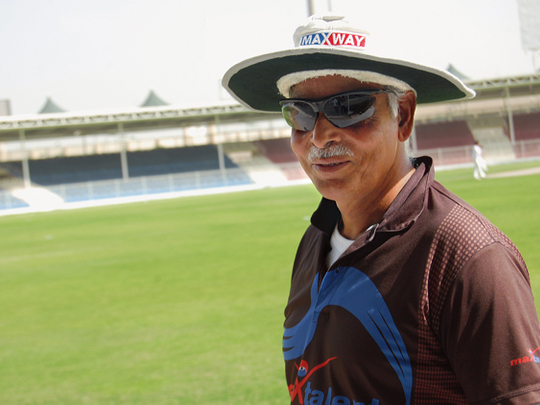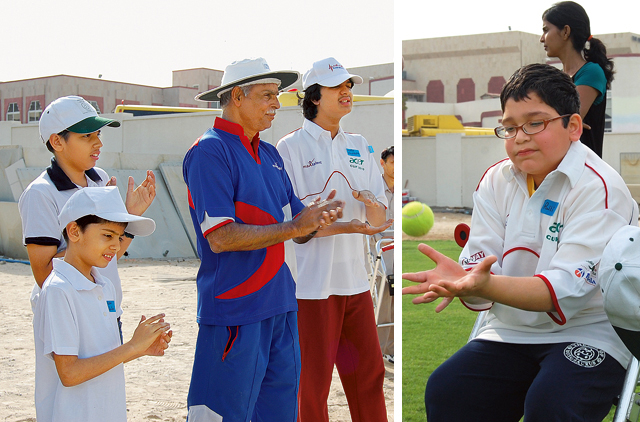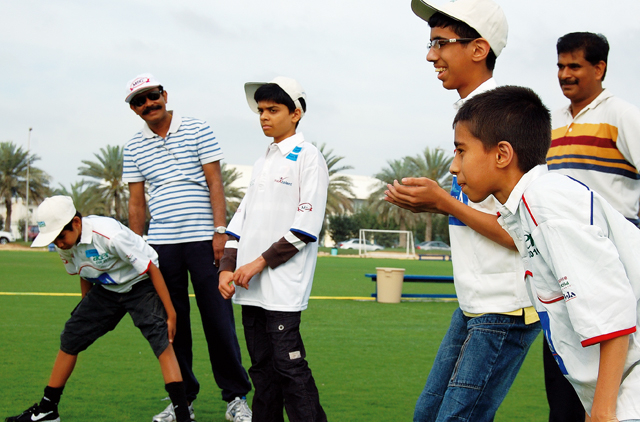
Fourteen-year-old Saeed (names changed to protect identity) squints at the batsman, then at the wickets, takes long measured strides just like his idol, former Australian international fast bowler Brett Lee, before running in to bowl in a clean fluid action. The onlookers at the cricket ground in Al Nasr Sports Club, Dubai, cheer when the ball beats the batsman. Flushed with pride, Saeed begins walking back to his run-up mark, and it’s only then that his confident stride changes slightly into a shuffle, revealing the fact that he’s a special needs child – he is autistic.
Regardless, his teammates, coach and all the spectators agree that he is one of the star bowlers of the day. And it’s success stories like Saeed’s that have made the Max Talent Cricket Academy’s sports initiative for special needs children, Let’s be a Little More Human, a big hit. Max Talent is the brainchild of 53-year-old cricket enthusiast, Sudhakar Shetty, who gave up a successful job in sales in a multinational firm to start the academy.
The organisation not only has a range of coaching programmes for regular students across the UAE, but it now offers a specially developed scheme to help children with special needs, so they can benefit through sport. Max Talent, which is approved by the Dubai Government’s Knowledge and Human Development Authority (KHDA), a regulatory body responsible for the growth, direction and quality of private education in the emirate, has shown that it is possible to inspire special needs children not only to play sport, but also to integrate into the mainstream.
The Let’s be a Little More Human programme kicked off five years ago, when Sudhakar, an Indian expat, began talking about his passion for cricket while visiting a family friend in Dubai who has a special needs child. “My friend Meeta Chopra’s son, Pulkit, then aged nine, became very excited,” he says. “‘I can hit a four’, he told me. I offered to bowl to him in the little play area below their apartment, and although he was in a wheelchair at the time, he wielded a plastic bat and managed to hit the ball.
I was excited by his enthusiasm and invited him to come along to watch a game.” The little boy looked dejected. “I’d love to come,” he sighed, “but what I’d really like to do is play.’’ “It was a poignant moment, and it hit me hard,’’ recalls Sudhakar, who had been a state-level cricketer and athlete as a student in India. “Here was a child who wanted to play the game, but couldn’t because of his condition. It was totally unfair. I wanted to give such children a chance to play too.”
Game on
Sudhakar asked Meeta if she could organise some games for special needs children under the aegis of the Society for Advocacy and Awareness Towards Holistic Inclusion (Saathi), a charity that helps special needs children and adults, which she is a member of. “Pulkit, who overheard this, was overjoyed and excited,” says Sudhakar. “He said with glee, ‘I’ll also play cricket!’.” Within three weeks, Sudhakar and Meeta arranged a game of cricket for special needs children at the Al Nasr Sports Club.
Around 40 children from five organisations that work for special needs children like Al Noor Training Centre for Children with Special Needs and Special Needs Future Development Centre, among others, participated. “We held that camp for both boys and girls,” says Sudhakar. That event was only the start. The most recent match, which saw scores of special needs children bowling, batting, fielding and cheering, was in October this year at Al Nasr.
The children were overjoyed to play the game that they had only previously watched on TV. “It was an eye-opener for us parents,’’ says Varghese Abraham, 48, whose sons, John, 16, and David, nine, are autistic (names changed to protect identity). “The children were so happy to play the game. It showed us how sports can help change a child’s attitude.” They are now more positive, cheerful, better focused and are learning the values of being part of a team.
“We face challenges trying to keep our hyper-energetic children occupied every day. The initiative made us realise that sports could be a great way of doing that. Besides being an excellent way to exercise, cricket is also a huge attraction to them, because matches are on TV so regularly,” says Varghese. “Before, they would moan about exercise, but now, the moment I pick up the ball, they are ready with the bat to go outdoors.”
Prior to holding the cricket coaching camp, Sudhakar decided to attend a workshop on dealing with special needs children, so he could get a deeper understanding of their requirements and how to handle them better. “I had no experience of handling special needs children and wondered how I could coach them in cricket,’’ he says. “At the workshop, I also learned that 50 special needs children from the Special Needs Future Development Centre played regularly at Zabeel Park in Karama, so I decided to join them to see how their teachers worked with them.
“The first day was a fantastic experience,” he says. “I realised they were just like regular kids, squabbling over who would bat and who would bowl. After observing them for some time, I stepped in, offering to be their umpire. For a moment, they were wary, but they soon accepted my offer. “After ten minutes, I suggested that we play a match. The word ‘match’ was a catalyst, and they jumped up yelling ‘yeah!’. So we split up into two teams and played for about half an hour. It was really good fun – so much fun in fact that people even gathered around us to watch the action.
“I immediately decided that it would be best to involve everybody; the kids, their parents and other children without special needs in our coaching sessions,” he says. And he’s proud that his initiative is beginning to show results. Several parents have told him how the coaching programme has improved the life of their special needs child. Hamid, whose daughter Aisha, 11, goes to the Senses Residential and Day Care for Special Needs, says, “Ever since we started taking her for the once-a-month cricket session, she is so happy, because she loves the game so much.
“She is so happy to get the chance to play with other special needs children as well as regular children.” Meeta, whose son Pulkit has now become a passionate cricketer, agrees, “It has changed the lives of not just my son, but many other special needs children. Some of the children are very talented. Earlier, there were few opportunities to discover their sporting talents, but now, with Sudhakar’s initiative, they have a chance to find out what they’re capable of.”
Making progress
Sudhakar is happy with the progress, “In the first camp, one boy imitated the bowling action of Pakistani fast bowler Shoaib Akhtar,” he says. “When I called him by the famous cricketer’s name, he would puff out his chest, thump it with pride, and declare, ‘I’m Shoaib Akhtar!’. He turned out to be a good cricketer. “Cricket is an easy way to get them to participate. It opens them up in ways even their teachers and parents had not thought possible. I’ve seen how it changes their lives.
“After we started the classes, I saw my players open out and participate more openly in other activities as well. Once at a programme at Al Noor Centre, I saw my team of special needs cricketers participate in a fashion show! They appeared to be having so much fun.” Sudhakar, who has Max Talent Cricket Academy centres in Dubai, Sharjah, Ajman, Ras Al Khaimah and Fujairah, encourages able-bodied children to play with special needs children. “We want to instil a moral obligation in regular children to look after those less fortunate than themselves,” he says.
The cricket coaching classes for special needs children are conducted once a month at Al Nasr Sports Club and Sharjah Wanderers Sports Club alternatively. “We’d like to conduct weekly classes, but parents find it difficult coordinating in the weekends too,” says Sudhakar. “That’s why we alternate between Dubai and Sharjah, so children in both emirates can attend.” The only complaint parents have is that there are not enough of such classes and venues for their children. “We require an air-conditioned indoor area for the sport, and it’s not easy to find them,” says Meeta.
Sudhakar is now looking to integrate the children’s talents into mainstream cricket. “It would be a great achievement and serve as an example for parents of other special needs children to allow their kids to discover what they can do.”“It’s a great thing Sudhakar and his team are doing for special needs children,” says Safia Bari, founder and director, the Special Needs Future Development Centre. “Even if they are not integrated into the mainstream right now, the sheer joy our children get from these few hours with them is well worth it.”













